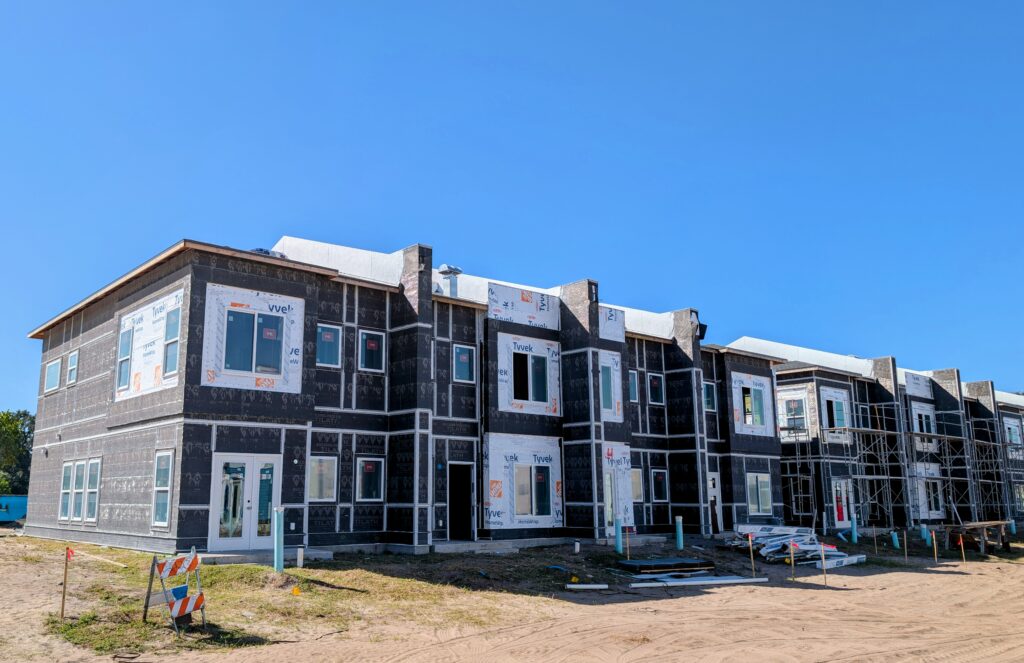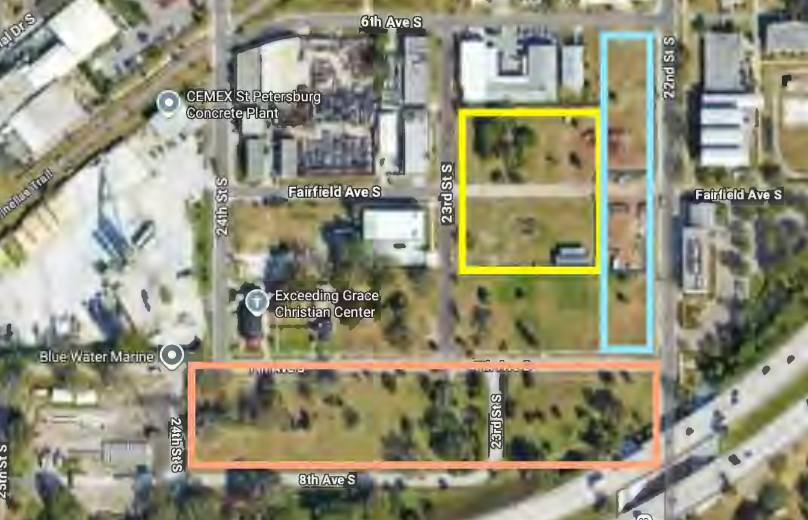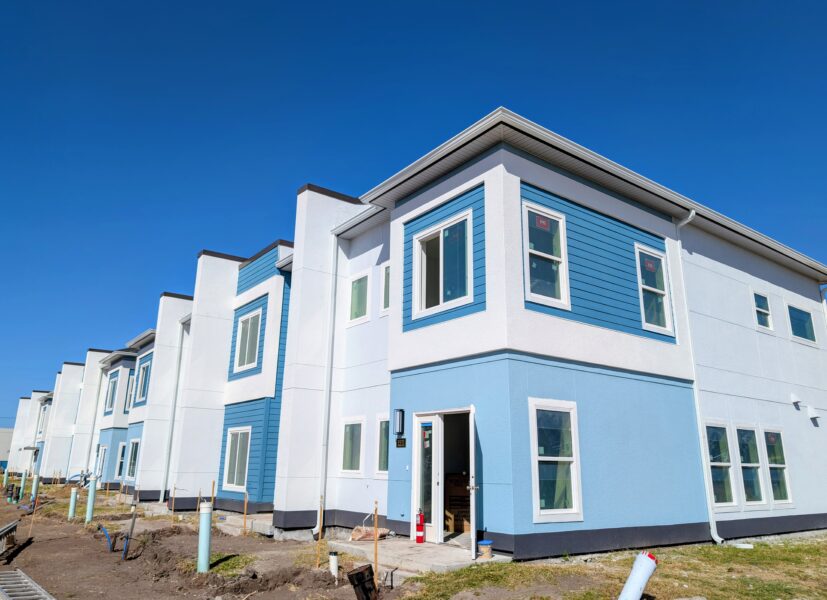An embattled and heavily subsidized townhome project in South St. Petersburg should open in the spring of 2026 – five years after the city approved initial agreements.
However, construction on the development’s commercial component has yet to commence, and officials are now terminating their contract with One Community, the local nonprofit overseeing those efforts. City Development Administrator James Corbett told council members Thursday that they would seek “alternative plans.”
The public subsidy for each of the Deuces Rising project’s 24 units is nearly $500,000. While the development will provide much-needed affordable homeownership opportunities, the city has yet to establish a cost.
“We’ve got high rises downtown that took less time,” said Councilmember Gina Driscoll. “I think it was around $19 million that the city put in, which eliminated the possibility of using any proceeds from the sale of the townhouses to fund the commercial space that we still want.”
Former Mayor Rick Kriseman first announced the Deuces Rising project at the corner of 7th Avenue and 22nd Street South, across from the Manhattan Casino, in December 2019. The long-deferred goal was to spur revitalization along the culturally significant corridor.
The Sankofa Vision Group initially proposed 40,000 square feet of commercial space on the city-owned property to house shops, offices, a startup incubator and a restaurant or cafe. Officials paused those plans as construction and soil contamination remediation costs soared.
“It’s been an amazing journey acting as a developer, and you learn why nobody else did anything for, I don’t know, 20 or 30 years,” said City Administrator Rob Gerdes. “But we’re so excited to have progress on the site.”
City council members, in a 5-2 vote, approved a $19.1 million contract with Tampa-based Horus Construction Services in January 2024. St. Petersburg’s financial lift could have been exponentially worse.
Black-owned Horus Construction’s guaranteed maximum price once ballooned to $33 million. Gerdes whittled that down through extensive negotiations.
However, Councilmember Lisset Hanewicz noted that the land and previous site work pushed the public subsidy to over $800,000 per townhome. “You couldn’t run a business like this,” she said at the time.
Driscoll asked Gerdes to name the project’s contractor Thursday as the discussion concluded. Horus Construction is part of a development team that recently submitted a $6.8 billion proposal to redevelop the Historic Gas Plant District; the administration is now moving forward with that process.
Councilmember Deborah Figgs-Sanders noted Sankofa was once part of the Deuces Rising project, and she would not let Horus Construction, owned by a St. Pete native, “take the heat for the time it took.” Conversations with administration highlighted the “hurdles that they were faced with.”
“I get to see firsthand where the equity and equality in the city’s development are not always equitable or equal,” Figgs-Sanders added. “Talking to affordable housing developers – it is not something that we have people jumping at the gun to build affordable housing.
“Unfortunately, all of the affordable housing developers don’t have the millions and billions that the high rises actually have, and when it comes to benefitting certain areas of our community, we find that progress to be just a tad bit slower than some of the other developments.”

Construction on one side of the affordable homeownership development lags behind the other.
The city’s engineering department is working to resolve public easement issues with Duke Energy, which has not prioritized those efforts. Officials will begin marketing the homeownership opportunities to residents before receiving a certificate of occupancy next spring.
Mark Van Lue, director of housing and community development, said “targeted marketing” would provide the “most opportunity” for those who live in the South St. Pete Community Redevelopment Area (CRA) to apply for those homeownership opportunities.
In January 2024, half of the 24 two and three-bedroom townhomes were for residents earning less than 80% of the area median income (AMI), or $75,150 for a family of three. The remaining workforce units are for those earning up to 120% of the AMI, or $112,680 for a family of three.
At the time, sales prices ranged from around $220,000 to $320,000. Van Lue said Thursday that the city must still “finalize all the numbers.”
Homeowner’s association fees are a factor, and Van Lue said the administration must ensure it complies with the affordability requirements. Corbett said the city still wants commercial space to house small offices and businesses, and “potentially some incubator space.”
Officials will launch a request for proposals (RFP) process unless they receive a favorable unsolicited bid to lease that parcel. “You’ll see a theme here – we’re trying to activate the corridor,” Corbett said.

An overhead map of the Deuces Rising Townhomes property (yellow) and its commercial space (blue). The city previously offered the land in orange to the Woodson African American Museum of Florida. Image: City documents.
Museum property
The agreement with One Community will amicably terminate in November. Administrators will also market 5.5 adjacent acres once earmarked for the Woodson African American Museum of Florida.
Kriseman dedicated the land, about a quarter mile north of the current facility at 2240 9th Ave. S. in Jordan Park, the state’s oldest public housing community, to the museum in 2019. Stakeholders, including Welch, are adamant that the Historic Gas Plant District’s redevelopment should house the institution.
“Once that is settled and we know the Woodson’s future is cemented somewhere else, we would look to do a mixed-use project,” Corbett said. “Again, activating the corridor. But also residential components, and we would do a competitive RFP to develop that site.”
Driscoll agreed that the museum should be in the Gas Plant. However, she questioned the wait to dispose of the gifted property when a “greater opportunity” exists and South St. Pete needs additional housing and affordable retail space.
Corbett said the administration needed “time to adjust” after the Tampa Bay Rays exited the previously agreed-upon Gas Plant redevelopment deal. The city also wants to ensure the 5.5 acres complement the Deuces Rising project, the Manhattan Casino’s reopening and other upcoming developments on the corridor.
“I just don’t want to delay progress, especially in this part of our city, any longer than is absolutely necessary,” Driscoll said. “And five acres in St. Pete terms – that’s a lot.”
The city will provide community updates and gather feedback on multiple projects in the Deuces Corridor projects Thursday, Oct. 30, from 6 p.m. to 7:30 p.m. at the Enoch Davis Center.

